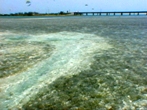U.S. Secretary of the Interior Ken Salazar approved the Record of Decision (ROD) for the Crescent Dunes Solar Energy Project located in Nye County near Tonopah, Nev.

New submarine volcanoes, a large hydrothermal field with a thriving exotic animal ecosystem, and areas rich with deep-sea ocean animals are among the discoveries they reported.
The company provides protective linings for processing equipment.
UL Environment Inc. will be launching an Environmental Product Declaration (EPD) Program in January 2011 to provide a comprehensive, globally recognized, and scientifically robust mechanism to consistently evaluate environmental claims on products.
Researchers need a tool to monitor perchlorate in drinking water in real time.
This is the seventh Sims Recycling Solutions facility in North America to be certified to OHSAS 18001, the international occupational health and safety management system standard

Washington University study is tweaking the catalyst to complete the methane to ethane reaction.
Twenty-four conservation projects will benefit fish and wildlife on more than 5,900 acres of coastal habitats.
Along with solvent delivery, The Dow Chemical Company subsidiary provides waste management, technical support, and use of stabilizers, additives, and test kits.
The first underwater robotic vehicle to cross an ocean will be the centerpiece of a new exhibit that opened in the Sant Ocean Hall at the Smithsonian National Museum of Natural History on Dec. 9.
New criteria to protect people from potential illness will be developed by October 2012.
DCS Global said the device can save more than 30 percent on energy costs when compared to sliding doors being left open.
Kevin Vaughan did not get the necessary permits to move earth near the Missouri River in Dixon County, Neb.
Company names Melissa O'Mara vice president of Green Buildings Solutions.
EPA document shares information on flexible tools and techniques to help systems tailor a program to meet water loss prevention needs and maintain infrastructure.
ACEEE says 26 states now have developed a standard, representing 65 percent of U.S. electricity demand.

Results of a five-year monitoring effort to repair seagrass damaged in a boat grounding incident suggest that restoration techniques such as replanting seagrass can speed recovery time.
Respondents called for health studies and tighter public disclosure requirements.
Plaintiffs' attorneys claim clients were contacted directly and asked to waive their rights to sue Cabot Oil, which used hydraulic fracturing in Pennsylvania, because they were getting compensation through a state consent order.
The Veolia energy company will develop energy efficiency measures for Branford, Durham, Guilford, Killingworth, Madison, and Westbrook